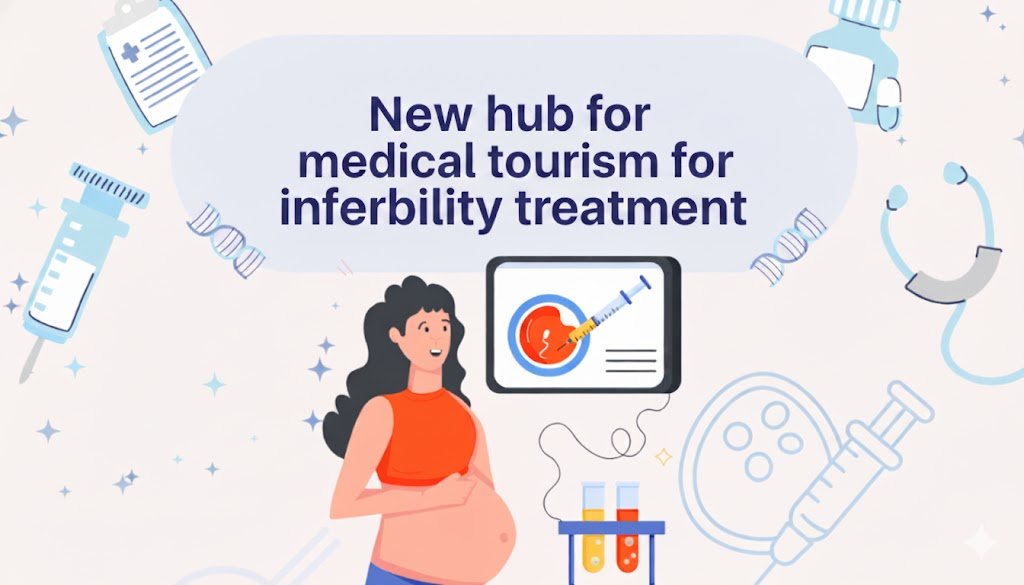Spain as a Refuge For Women Seeking Infertility Treatment
Many French women face limited access to a range of infertility treatments. Against this backdrop, Spain, especially Barcelona, is becoming a popular destination for women seeking high-quality, modern medical care. Here, reproductive medicine combines scientific precision with human warmth, and every patient feels cared for and respected. The growth of medical tourism related to in vitro fertilization (IVF) is primarily due to the possibility of preimplantation genetic diagnosis (PGD-A), the widespread use of donor eggs, and access to technologies that are ethically or legally restricted in many countries.

Women, regardless of their marital status, come to Spain for its humane approach, personalized treatment, and atmosphere that promotes psychological comfort. Many note that medical practice here is closely intertwined with a culture of respect for the female body and the right to informed motherhood.
French restrictions: the reason for seeking treatment abroad
In France, ART programs are funded by the state but are strictly regulated. PGD-A (DPI) is only permitted in exceptional cases of serious hereditary diseases and is carried out in accordance with strict protocols. The use of donor eggs is accompanied by strict rules and long waiting times.
- This limits women’s access to modern methods that can significantly increase the likelihood of a successful pregnancy and reduce the risk of miscarriage.
- In addition, access to donor eggs is extremely limited: a shortage of donors, anonymity, and long waiting lists force patients to seek alternatives abroad.
- Many patients also face administrative barriers and insufficient emotional support, making treatment abroad not only a medical but also a psychological alternative.
Restrictions and features in the US
The situation is different in the United States: ART legislation is more flexible, but in practice, access to IVF and PGD-A is limited by high costs and a lack of public funding. Insurance companies rarely cover ART programs, especially when it comes to egg donation or preimplantation genetic diagnosis. On average, the cost of a full IVF cycle with genetic testing exceeds $35,000–40,000 (excluding medication). In addition, there are differences in regulations in different states: some allow surrogacy and donation, while others have moral and religious restrictions on the use of embryos and genetic testing. Patients from the US often choose Spain to receive the same technologies at a more affordable price and without bureaucratic obstacles. The human factor is also important: Spanish specialists are known for their gentle communication, attention to the emotional aspects of treatment, and respect for the patient.
Spain: openness, competence, and technological advancement
Spain is a leader in the field of reproductive medicine thanks to liberal legislation that allows:
- the use of PGD-A;
- Anonymous egg and sperm donation;
- Embryo freezing;
- Treat single women and female couples;
- Offer the ROPA method (for married female couples within the law).
Many clinics are adapted to the needs of foreigners: the staff speaks French and English, coordinators are available, documents are translated, and logistics are organized with limited stay times in mind. In addition, patients are provided with support at every stage, from donor selection to post-procedure follow-up. High success rates are achieved through personalized protocols, innovative technologies (PGD-A, AI incubators, time-lapse monitoring, strict laboratory quality control), and interdisciplinary collaboration between reproductive specialists, embryologists, and geneticists.
Regulations: France, USA, Spain (summary)
France
— The Bioethics Law of August 2, 2021 (Loi n° 2021-1017), which expanded access to ART for single women and female couples and established rules for access to donor data for children upon reaching the age of majority.
— Public Health Code (Code de la santé publique), sections on preimplantation diagnosis (PID), including articles and regulations defining the conditions and indications for PGD-A.
— Procedure and supervision by the Biomedicine Agency (Agence de la biomédecine) of ART centers and the use of PID.
United States
- The Fertility Clinic Success Rate and Certification Act (FCSRCA) of 1992: mandatory reporting to the CDC and publication of clinic success rates (regulation is mainly reporting rather than clinical).
- No uniform federal substantive law on ART: regulation is a “patchwork” at the state level (insurance mandates/exclusions; differences in embryo status and the admissibility of genetic testing). In some jurisdictions, court rulings may affect the status of embryos and the liability of clinics, creating legal uncertainty for patients and providers.
Spain
— Law 14/2006 on Assisted Human Reproduction Techniques (Ley 14/2006): basic act allowing access to ART for adult women regardless of marital status and sexual orientation; establishes the anonymity of gamete and embryo donors; prohibits surrogacy.
Subordinate legislation on tissue/cell donation and quality control, regulating donor selection and compensation, biomaterial traceability, and safety.
— Practical clarifications on the ROPA method: available to married female couples in accordance with civil status and with the aim of preventing abuse of donation.
Why Spain wins (key advantages for patients)
Legal access: a clear regulatory framework for PGD-A, donation, and treatment of single women/female couples; no ambiguous court practice affecting the daily work of clinics.
Speed and predictability: short waiting lists for donor programs, well-organized logistics for visits (often only one visit is needed for donor cycles).
Large donor pool: high screening standards, phenotypic matching, psychological assessment, eukaryotic guarantee in advanced programs.
Technological level: PGD-A, time-lapse incubators with AI elements, strict laboratory SOPs, and external quality audits.
Cost-effectiveness: the cost of an IVF cycle with PGD-A is significantly lower than in the US; transparent estimates and no “hidden” insurance surcharges.
International service: multilingual teams, translation of documents and prescriptions, coordination with the attending physician in the country of residence, telemedicine.
Emotional comfort: the Mediterranean climate, the cultural environment of Barcelona, and the clinics’ focus on psychological support reduce the stress of treatment.
New standards for donor programs: eukaryotic guarantee

Previously, clinics offered a fixed number of eggs or blastocysts. Today, advanced centers such as the NatuVitro reproductive medicine clinic in Barcelona guarantee not just embryos, but genetically healthy ones that have been tested using PGD-A. This reduces medical uncertainty and increases the chances of success. The programs include individual donor selection based on phenotype, psychological evaluation of donors, and transparent embryo quality criteria.
Barcelona: medical capital and place of power
Its geographical proximity to France, developed infrastructure, and high level of medical services make Barcelona an ideal destination. The unique combination of climate, cultural richness, and European comfort turn the trip into a healing journey. Women combine procedures with relaxation: enjoying the beaches, Gaudi’s architecture, gastronomy, and the atmosphere of Mediterranean tranquility. This reduces stress and improves overall well-being. Many note that the positive energy of the city helps restore emotional balance and faith in the success of treatment.
Simplified logistics for patients
Patients are provided with translated documents and prescriptions that are valid in France, and hormone treatment can be carried out under the supervision of a French doctor. Standard IVF requires two visits: puncture and embryo transfer. In the case of IVF with egg donation, only one visit is required. Daily flights from major French cities make travel convenient and fast. For American patients, there is a simplified procedure for online consultations and remote treatment coordination, allowing them to begin preparation without leaving the country.
American interest: quality at an affordable price
Medical tourism to Barcelona is also popular among American women. In the US, the cost of IVF with PGD-A can reach $40,000, while in Spain it ranges from €6,000 to €8,000. Even with travel and accommodation costs, the total cost is significantly lower, and the result is the same, if not better.
In addition, Spanish clinics create a personalized, calm atmosphere where patients feel involved and supported at every stage.
International experience: medicine without borders
The intense flow of foreign patients has allowed clinics to invest in technology and personnel, ensuring increased efficiency and reduced costs. This has created a culture of openness and trust, where medical care abroad is perceived not as a complication, but as an opportunity to get the best. Today, Barcelona is a symbol of medical universalism, where science, culture, and the destinies of women from different countries come together.
Barcelona — a place where body and soul are healed

Choosing Barcelona is not only a practical decision, but also a personal, emotional one. It combines high medical standards, ease of access, warmth, and a European quality of life. For women who dream of motherhood despite the difficulties, Barcelona has become a symbol of hope, a new beginning, and the confidence that modern medicine can combine dreams and science in one wonderful result.

